
In representing more than 500 athletes in four different sports across four different continents with a staff of 130 and growing, Rich Paul has built not only one of the strongest agencies in the world, but a brand to match.
However, when he ventured out on his own with a new vision for a representation business in 2012 and started Klutch Sports Group with Fara Leff, not everyone had the faith in him that he had in himself.
“Paul is a good guy who’s starting a little four-person business,” an anonymous industry insider told Deadline at the time. “We wish them well.”
A dozen years later, “that little four-person business” has done roughly $4 billion of deals for the planet’s elite superstars.
What Paul created alongside his colleagues at Klutch was a new formula for representation that put the talent at the center while grounded in the pillars of integrity, understanding, trust, commitment, and honesty. In doing so, he created a company that fostered a new type of agent best equipped to navigate the shift toward the modern athlete empowerment era and sports’ rapid globalization.
Establishing The Foundation
Paul’s incredible ascent improbably began at Akron-Canton airport in 2002, when he met LeBron James while selling vintage jerseys for a memorabilia store called Distant Replays, bonding over the baby blue Warren Moon Houston Oilers throwback he was wearing. They exchanged contact information, and Paul resourcefully parlayed that into joining LeBron’s inner circle alongside James’ longtime friends Maverick Carter and Randy Mims.
In the years that followed, Paul witnessed firsthand as the young superstar traversed the business of the sport, observing the back office moves that led to industry-shifting moments exemplified by James’ max contract extension with the Cavs in 2006.
As James ascended the sports entertainment hierarchy, Paul remained a steady confidant, building trust and opportunities of his own. Paul himself entered the agency space, working under Leon Rose, who represented James at the time. Under Rose at CAA, Paul assembled a portfolio of his own clients, including Eric Bledsoe, Tristan Thompson, Cory Joseph, and Michael Kidd-Gilchrist.
While Paul may have started his formal agency education at CAA, his true journey to greatness began much earlier.
“If you look at my resume, you would say, ‘Well, he did this, and he learned this at a previous agency.’ That couldn’t be more incorrect,” Paul told Rich Kleiman at the CNBC x Boardroom Game Plan conference earlier this month. “Actually, most of the things I attribute to my success today came from having a great example in my dad. You don’t get here by yourself, and I’ve had a tremendous amount of help in a very unconventional way.”
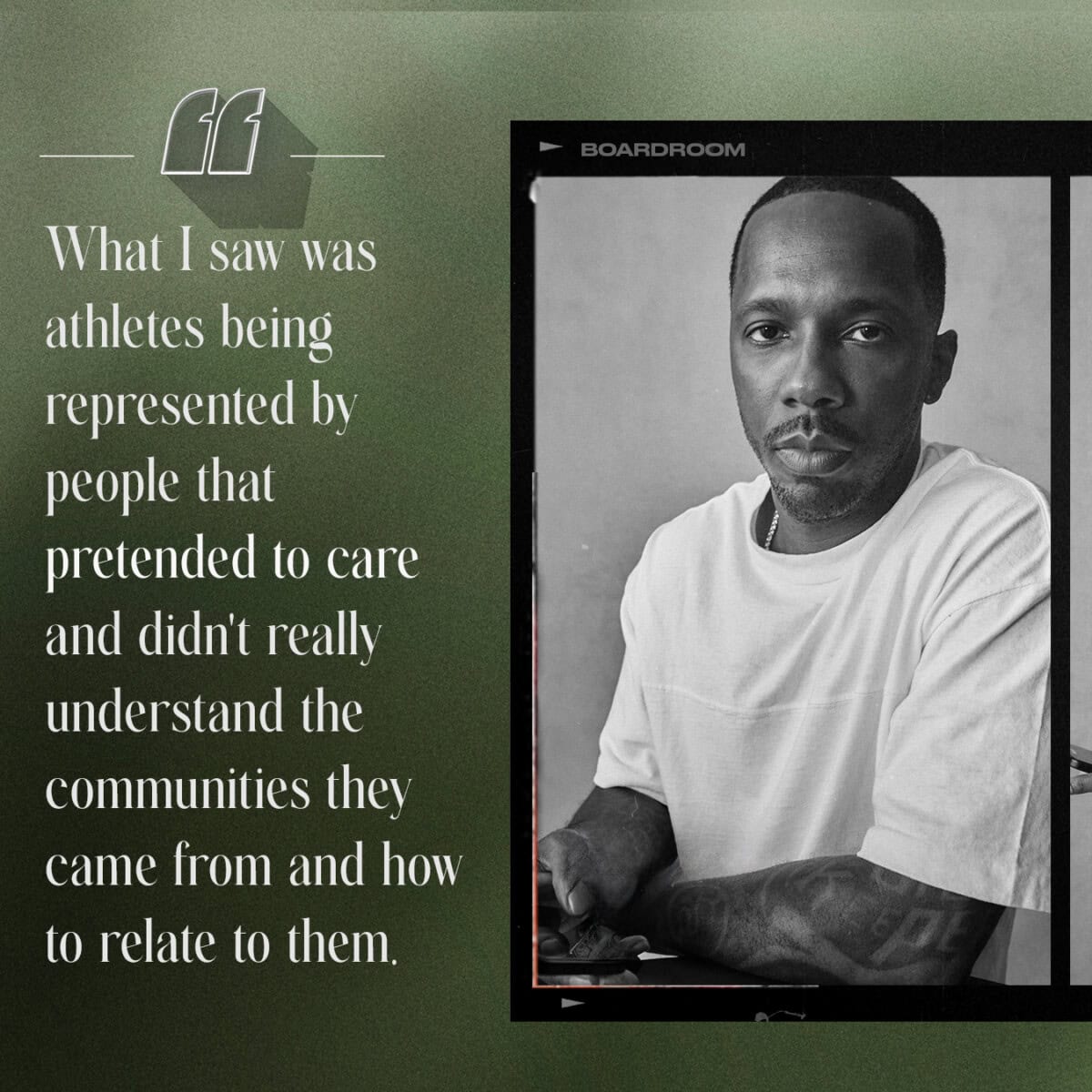
Paul recalls his childhood days in Cleveland spent at his father’s convenience store, R&J Confectionary, observing his work ethic as he sold low margin items like candy, cigarettes, and lottery tickets just to get by. Against the backdrop of a low-income neighborhood and its challenges, Paul watched his father run a business built on respect. There he learned foundational skills of relatability that fueled the foundation of what he aimed to build with Klutch.
During the early days in LeBron James’ inner circle, Paul met Leff, an intern at Marquis Jets, while helping book travel for basketball’s young phenom. The two remained in touch as they forged their own paths in the sports and business ecosystem.
“I was in a transition phase of not knowing what I was going to be doing,” Leff told Boardroom. “I had been around so many agents and athletes in my job, and I just trusted that he had a vision of how to do something differently.”
One day, Paul sent her a message laying out plans for this new business he was considering launching. They both knew that athletes possessed more power than the current system gave them. They had an overarching plan that would blow up the blueprint for running an agency.



Klutch Sports launched on Sept. 12, 2012, with Paul as CEO and Leff as COO, the same titles they hold today. Although they began with just one office in Cleveland, they had global visions from day one, even putting a globe in the logo.
“It was an aspiration, right? Having a vision,” Paul said. “I think growing up in such a chaotic environment, you had to really stand on a hope and this dream.”
The new company set out to achieve two goals: to shift the power paradigm and deliver for their clients in every possible way. They executed by creating authentic relationships with their clients, from building trust with their families to entertaining multi-million dollar endorsements for them in boardrooms.
Want More from Boardroom? Get Our Newsletter
“We always say [we’re in the business of] ‘client servicing,'” Leff told Boardroom. “That was the primary purpose of the agency at the time and still is to this day. It’s about realizing what more opportunities there are for athletes [beyond] just doing their contract.”
Their earliest clients took a chance on the start-up agency, but they saw something promising the legacy institutions couldn’t offer them.
“I picked Klutch Sports Group to represent me because I was always looking for a relationship that was deeper than just dribbling a ball,” Tristan Thompson reflected to Boardroom. “Klutch is about family, community, and unity where we want all the best for each other even though there are times we might bump heads and not agree.”
While many agents focus only on getting clients top value and delivering a return on investment, Paul learned from an early age one of the many ways in which Klutch could differentiate itself.
“I can’t beat the competition in every area,” Paul said, “but where I can beat them at is care. I’m going to focus on taking a guy like Eric Bledsoe and getting him more money than Kyle Lowry when he was an All-Star.”
This difference was felt instantaneously. The five-year, $70 million contract Bledsoe received from Phoenix in 2014 was the first major deal Klutch signed, directly leading to the hotly sought-after rookie Kentavious Caldwell-Pope joining the agency.
“KCP called me after that [and] we were able to build a business,” Paul said.
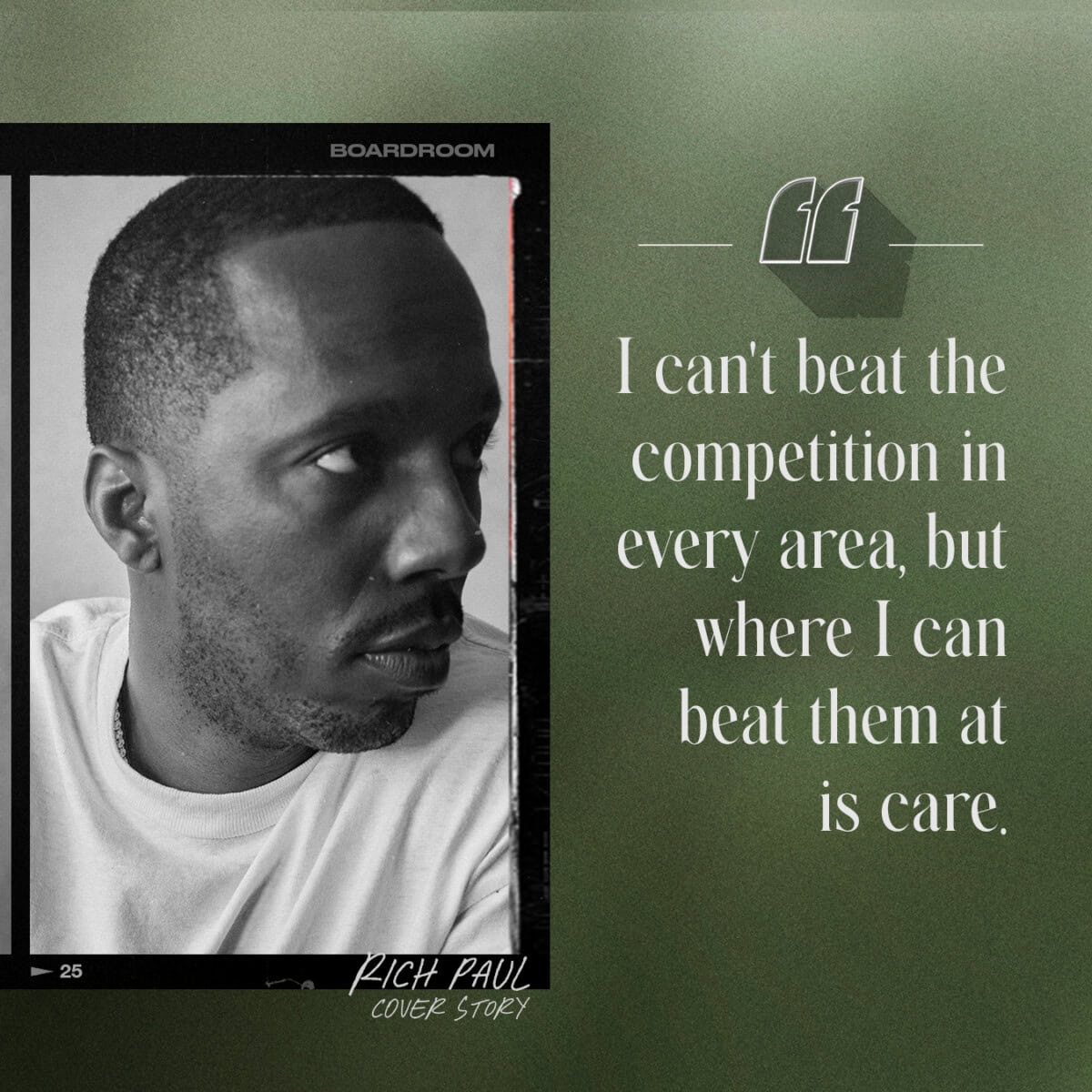
Assembling the Roster
From the start, Klutch understood that there’s wealth in diversity, taking pride in what he describes as a “Black-owned, woman-led” company. Paul and Leff were focused on building something where Klutch staff could sincerely connect with the athletes they represented.
Agencies often sent big teams to woo new talent, but Paul and Leff assembled an intentionally small staff. In fact, it was so far from the expectation, Leff said, that when she and Paul started having meetings with clients and their families, they often waited and wondered whether anyone else was coming into the room when it was just those two.
“Now,” Leff said, “not only are people even more excited to walk into that room and see Rich, but it’s overwhelmingly understood and praised.”
“The people that work in our office, corporate America wasn’t looking to hire those people. They couldn’t get in the mail rooms … because they don’t have an uncle, cousin, or chancellor that knew my grandfather.”
— Rich Paul
Paul wanted to make sure people had the opportunity to work for Klutch, who may not have had the best qualifications on paper but had a strong character, something Paul believes is scarce in the industry today.
“The people that work in our office, corporate America wasn’t looking to hire those people,” Paul said. “They couldn’t get in the mail rooms of these institutions that have been existing for so many years because they don’t have an uncle, cousin, or chancellor that knew my grandfather.”
The early team Klutch built around these foundational principles was ideally equipped to disrupt the agency business. That meant expanding from the original Cleveland office to cities like New York, Los Angeles, and Atlanta, where it would be easier to hire the best employees.
They also began to innovate how they supported talent. Klutch was beginning to scratch the surface of operating in a manner that deviated from the cookie-cutter way traditional sports agencies operated, according to Paul’s close friend and UnitedMasters founder and CEO Steve Stoute.
“He understood the athlete’s value and perception was both on and off the court,” Stoute told Boardroom, “and he paid attention as much off the court as he did on it.”
Quickly, Klutch established a reputation of integrity and respect, drawing some of the top talent in the NBA and launching a period of intentional growth that led to questions about what could be next.
“He understood the athlete’s value and perception was both on and off the court and he paid attention as much off the court as he did on it.”
— Steve Stoute
Going Global
The Klutch client list quickly became a who’s who of the NBA. Rich Paul could’ve been content with having a premier NBA agency, growing in worldwide stature and popularity along with the league as he evolved into one of its most formidable power brokers. By 2019, he was well on his way toward achieving that goal. While Klutch had a huge network and cultivated relationships, Paul wanted to be in the best position possible to support his clients with anything and everything.
“We always had this thing within the company that was if you got a no from us, that meant we exuded all energy and couldn’t come up with the answer,” Paul said, wanting to help the modern pro athlete accomplish literally anything he or she desired. “And I never wanted to be in a situation where a client called and we didn’t have the resource.”
Klutch had progressed to the point where it was seeking opportunities well beyond the scope of the court. It aimed, Leff said, to hire the best in podcasting, scripted, publishing, and content creation.
At the same time, UTA wanted to diversify the talent it represented beyond Hollywood and music. UTA CEO Jeremy Zimmer began meeting with different sports industry figures to see where there might be a fit.
When Paul and Zimmer first met, they had a 90-minute conversation, and Zimmer felt confident that the two were aligned and would be able to work and grow together. Paul’s story and vision for what Klutch could become aligned with the way UTA thought about the balance of power shifting toward talent, which meant providing clients the widest possible array of opportunities rather than just staying in one lane.
“Rich [as an] entrepreneur was incredibly compelling,” Zimmer said, “and to us, no matter how big we get, we don’t want to lose our entrepreneurial spirit. So those were all places where we felt really well aligned with Rich and the opportunity to get in business with him was undeniable for us. I’ve never really doubted the thesis and the opportunity of the partnership.”
Amid potential partners, Zimmer noticed one major difference with Klutch.
“A really important part of the magic of Klutch,” Zimmer told Boardroom, “is the way they take care of their players and the way they make their players feel. The odds are so wildly against you being successful and it takes so much consistent effort and work and rejection, ups and downs. So as the representative of those people who are charged with really getting involved in caring about their future, you’ve got to respect that, and you’ve got to have empathy and compassion for the ups and downs of that journey.”
“Rich is someone I feel really lucky to be in business with and is a great partner. The magic of Klutch is the way they take care of their players and how they make them feel.”
— Jeremy Zimmer
As the co-founder and CEO of a company worth north of $1 billion, Zimmer knows talent when he sees it. The same aura that drew in the biggest names in the NBA instantly appealed to Zimmer.
“Rich is very driven in an easygoing way,” Zimmer said. “It doesn’t feel like it’s all part of a plan. It’s not some sort of guerrilla offensive where if I don’t get what I want, I’m going to kill somebody. He’s got a very charming and confident way about him that makes him a pleasure to be around.”
In the summer of 2019, UTA made a significant financial investment into Klutch Sports, naming Paul the head of its new sports division. Paul thought there was so much to build with UTA, calling the new partnership a blank canvas for Klutch. But perhaps more importantly, he was impressed by the character and integrity within UTA leadership, who worked tirelessly for their clients every day despite being a long-established fixture.
Expanding the Game
While there was never a vision to go into the NFL one year and then MLB the next, the new relationship opened up new opportunities for Klutch. Its combined resources with UTA quickly put the agency’s ambitions on an easier trajectory to be realized.
UTA and Klutch worked closely to identify opportunities and helped drive them to fruition, Zimmer said, bringing the companies and their respective clients closer together in forming a more integrated relationship. However, any company Klutch would acquire still had to embody its own foundational philosophies and standards, Paul said. In addition to being a good business that leadership is enthusiastic about, a potential acquisition has to have a good culture and a strong approach to what it does.
“It’s been a process of building side by side in a way where you have to be really close, and you have to really become real partners,” Paul added.
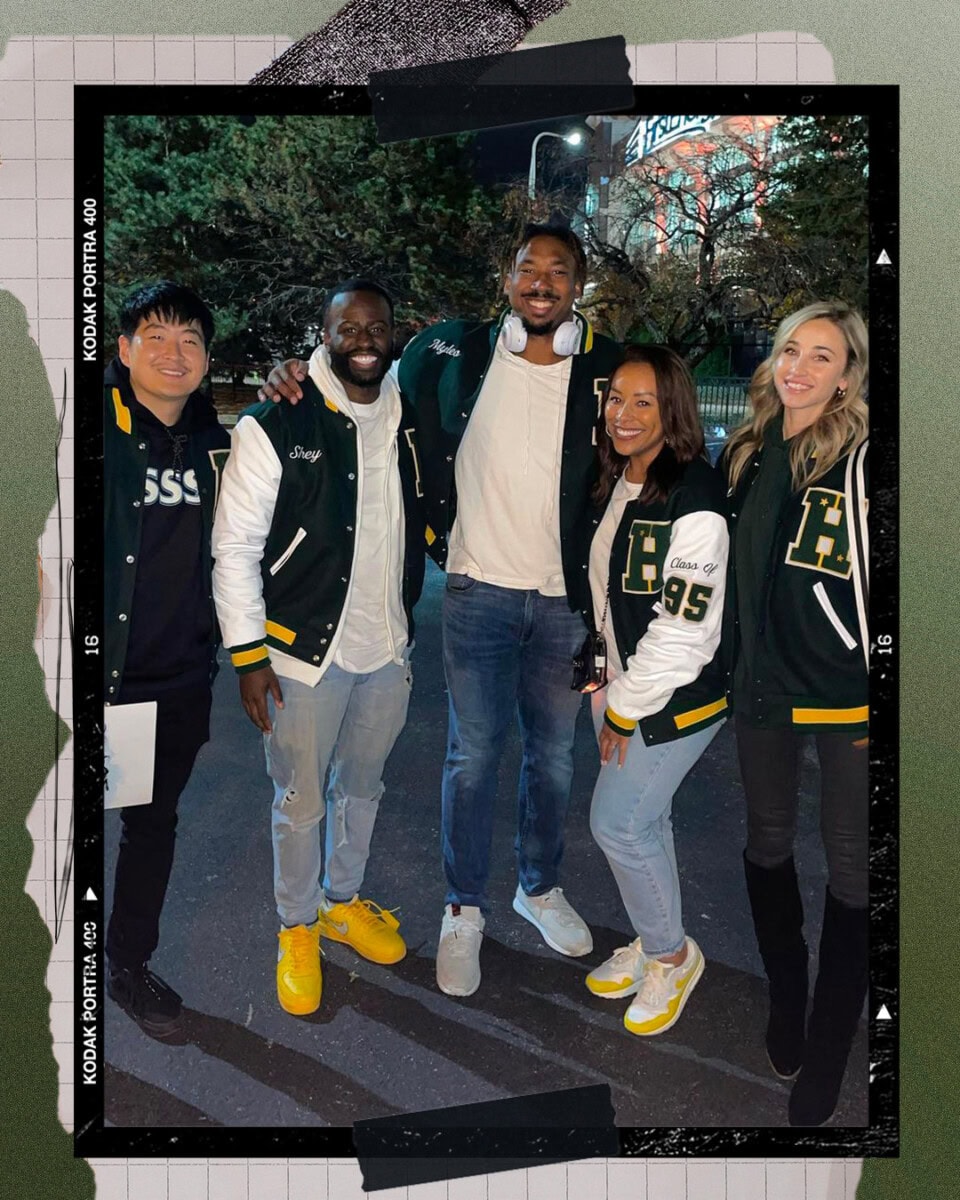
In September 2019, two days shy of Klutch’s seventh anniversary and less than three months after finalizing the UTA partnership, it hired NFL agent Damarius Bilbo in its first agency foray outside of the NBA. They also recruited Nicole Lynn, who signed on as President of Football Operations and later became Klutch’s President of Football.
All-Pro defensive end Myles Garrett recalled meeting with Lynn ahead of the 2017 NFL Draft. At the time, he appreciated the way she pitched herself but didn’t think that she had enough resources around her to help him make the moves he foresaw for himself and went in a different direction.
When she joined Klutch, Garrett felt it was the “perfect opportunity, a perfect synergy,” and signed with the agency in 2022. In his time with them, Garrett has been continuously inspired by how Paul continues to hustle in a way that Klutch’s younger staff learns from.
Want More from Boardroom? Get Our Newsletter
Once Paul and Klutch started building, it’s been impossible to slow them down.
Klutch launched a women’s basketball division in 2022 led by veteran agent Jade-Li English, starting with three-time MVP A’ja Wilson, Chelsea Gray, Alisha Gray, and a young high school prodigy named Juju Watkins. It acquired Rep 1 Baseball a year later, with several current and former All-Stars on its roster led by Rafael Devers. This year, Klutch expanded its global footprint, acquiring One Legacy Sports Management to grow its NBA roster with a focus on Canada, and bought German soccer agency Representatives Of Outstanding Footballers (ROOF) with more than 150 clients across Europe’s top five leagues.
When Seattle Storm superstar Jewell Loyd, also a part of the Klutch family, thinks of the agency, two words come to mind: innovative and authentic. Those qualities stuck out right away for the three-time All-WNBA athlete, who knew English and Klutch were the right fit by making her success on and off the court their immediate priorities.
“Jade-Li’s passion and dedication to my career established a true foundation of trust between us,” Lloyd told Boardroom. “Their unwavering support and consistency continue to remind me that I chose the right people to have in my corner. It’s clear that Rich and Klutch are creating a lasting impact across all sports and think big.”
Similarly, Wilson highlighted the way that her team helps her to identify opportunities that align with her core values and advocate for her at every turn. “I have an amazing team around me with my agency that’s like, ‘No, let’s continue to push you out there. Let’s have your face be seen,’” Wilson told Boardroom earlier this year. “‘Let those young kids have something to believe in.’ It’s my main goal.”
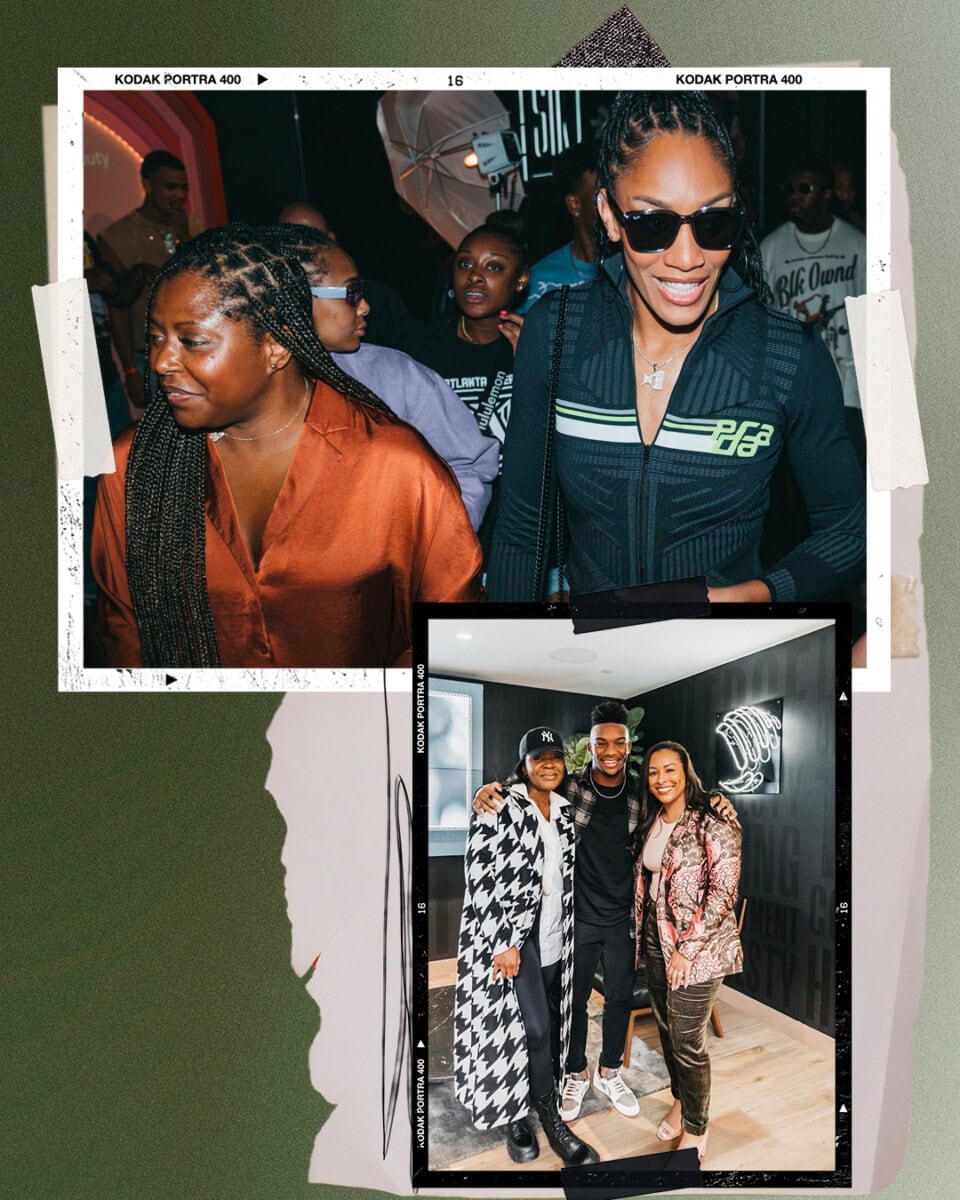
Along the way, Paul linked with New Balance to unveil Klutch Athletics, a signature line of performance wear tied to NIL and professional athletes on the KSG roster. Not only does it add visibility to the agency and the movement, but it’s distributed nationally and online by major retail partners such as Foot Locker and Dick’s Sporting Goods, as well as boutique retailers.
The mass-market play all builds off the success of Paul’s first footwear foray with New Balance, which he headlined in 2021. It’s uncharted territory for an agent who’s built a brand that rings bells domestically and worldwide.
“What’s the odds of that?” said Paul. “We were in 100 stores in the snap of a finger. My personal shoe at New Balance had 22 million impressions in China and it sold out in 45 minutes.”
Fueled by the agency acquisitions and one common set of values, Klutch has garnered the attention of the sports and entertainment business. After Time named it as one of the 100 most influential companies in 2021, GQ named Klutch among the 20 most creative companies in the world back in March.
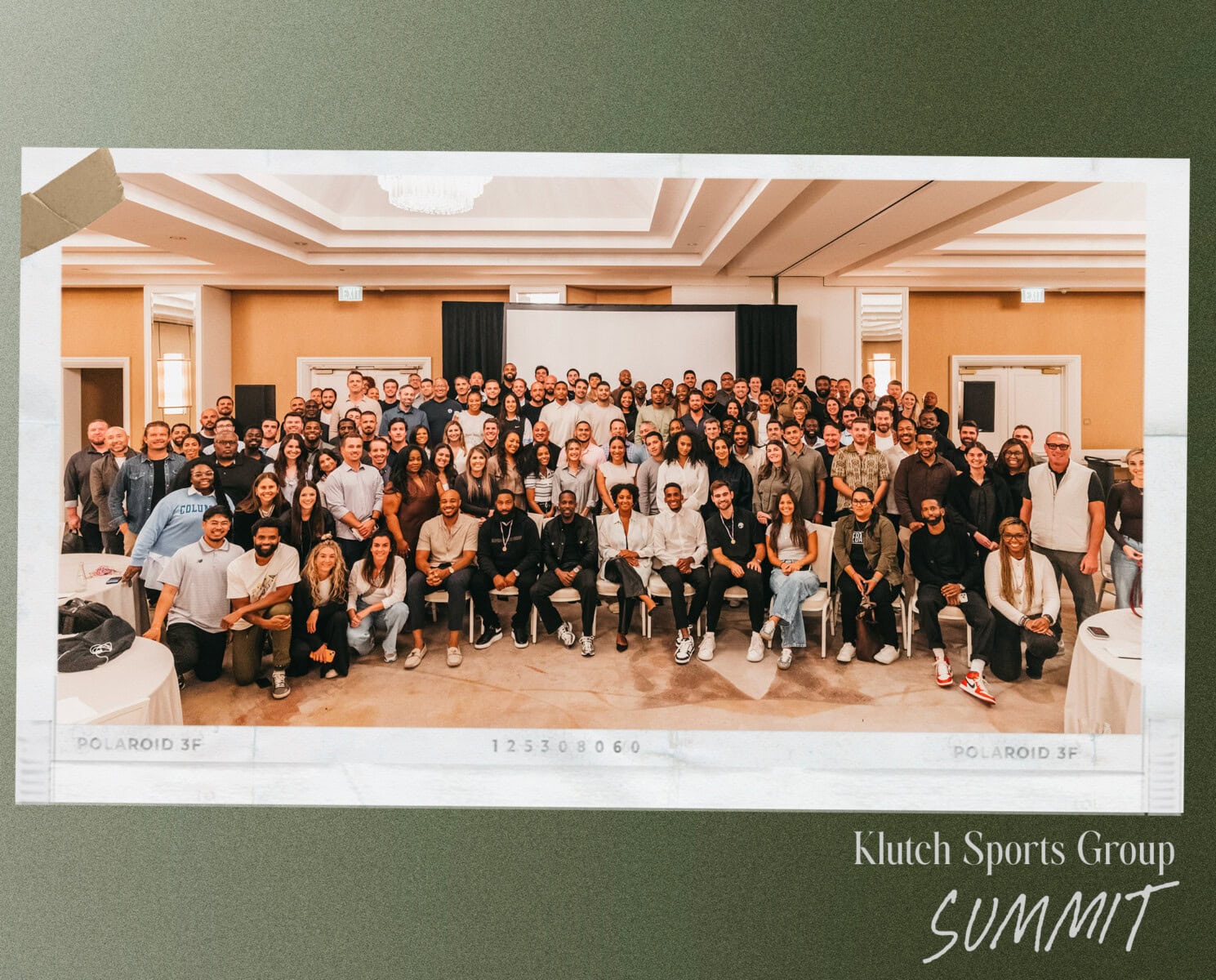
Redefining Success
Even in writing this story, it’s been hard to keep up with Klutch’s pace.
On Sept. 5, Klutch purchased Ballengee Football, which lists Malik Nabers and Travis Etienne among its star clients. Its rapidly growing global partnerships division added NYCFC as a client for its new stadium on Sept. 9 and helped broker a jersey patch sponsorship deal between the Memphis Grizzlies and Robinhood last Thursday. That same day, it hired former Arizona Cardinals General Manager Steve Keim, a two-time NFL Executive of the Year, as Klutch’s General Manager to help run the agency the way he ran an NFL team, Adam Schefter reported.
“Klutch has been such a blessing for me in both my personal life and career,” Atlanta Falcons star running back Bijan Robinson told Boardroom. “Rich has been an incredible mentor and has supported me every step of the way. When my agent, Nicole Lynn, introduced me to him, I just knew good things were coming.”
Regardless, Rich Paul is not one to rest on his laurels.
What he thought was a success 12 years ago and what he thinks it is now is totally different. Constantly redefining what success means has been essential to Paul and his team at Klutch.
“It’d be very easy to just kind of put your feet on the desk, go, ‘I’m Rich Paul, and I made it, and there’s not much you can tell me at this point,’” Zimmer said. “But what I love about Rich is he’s consistently curious, wanting to know and grow more while extending his skills as an executive. And that’s really an incredible quality, a genuine hunger for more knowledge and insight.”

Extending his skills is a major reason why Paul is on the boards of companies and organizations like Live Nation and LACMA. There, he draws inspiration for what’s next from the lessons behind what’s made these institutions successful and the mistakes they made along the way.
Klutch has been a huge force in the evolving relationship between sports and entertainment, according to Live Nation Entertainment CEO and President Michael Rapino, making him a natural fit for the company’s board.
“Rich is a renaissance man in sports, business, brand, and more, which is why he’s able to serve his athlete’s opportunities on and off the court,” Rapino told Boardroom. “Rich has been front row to the once-in-a-generation talent of LeBron and his growing global legacy, and Rich brings that rare lens to the table both for artists as they continue creating culture and our business as we aim to innovate the industry, advocate for artists, and enhance the fan experience.”
A lot of Paul’s success, Stoute said, can be attributed to his knowledge of and respect for the history of sports and hip-hop, fueling how he’s gone about his path and building his business.
“Rich understands the triggers, scenarios, relationships, and networks that built successful entrepreneurs in hip-hop,” Stoute said. “He’s taken that same exact idea and applied it to sport.”
While at the top of his game, he still loves to recruit clients and inspire Klutch’s 130 employees. He’s showing no signs of slowing down or pulling back on the daily grind.
“As long as I’m in it, I’m in it,” Paul said.
“Rich understands the triggers, scenarios, relationships, and networks that built successful entrepreneurs in hip-hop. He’s taken that same exact idea and applied it to sport.”
— Steve Stoute
Thompson told Boardroom that he’s been working with Paul and Leff since he was 17, nearly half his life, looking at them as family and lifetime advisors. The NBA veteran sees firsthand how Paul and Klutch still push the envelope on a daily basis.
“Seeing how much they have both grown has been remarkable,” Thompson said. “Rich and Klutch literally changed the narrative and became a unicorn in the space. He’s taken what he’s learned from his upbringing in Cleveland and learned how to integrate in this business, which has separated him from the rest while helping him connect with his clients on a deeper level that builds that family unity.”
With the agency he proudly founded just 12 years ago, Paul said he’s still a “toddler” in this industry, looking to further push and grow as Klutch continues to focus on creating opportunities to build generational wealth for its athletes. Now, Paul and Leff get to celebrate not only when their clients buy homes and cars but also when their staffers are able to do the same.
“You see the perception of an agent turning from that’s a shady guy or a black cat,” Paul said, “to now seeing where kids want to be agents, and you’re there as an example.”
As their partnership continues, Zimmer said, Klutch and UTA will find ways where athletes and artists can synergize and build their careers, build businesses, and achieve their goals and dreams.
Whether Klutch has had four clients or 500 and growing, the foundational principles Paul and Leff installed from Day 1 are what will carry the company to new heights, redefining what success looks like one day at a time. But one thing’s clear as they expand around the world and fulfill the dream that started 12 years ago with the aspirational globe in their logo:
Both Rich Paul and Klutch are only getting started.
Production Credits:
Creative Director – Michelle Lukianovich
Original Video – CNBC x Boardroom Game Plan, courtesy of CNBC Events
Senior Producer – Craig Newton
Writer – Shlomo Sprung
Story Editor – Griffin Adams with assistance from Ian Stonebrook
Photographer – Ryan Feng
Photo assistant – Daniel Brittain
Production Support – Jineen Williams
Head of Video – Andrea Masenda
Head of Social – Yoni Mernick
Head of Editorial Operations – Bernadette Doykos
Head of Audience Development – Jonathan Wiener
VP, General Manager – Nate Loucks
CMO – Sarah Flynn
Co-Founders – Rich Kleiman & Kevin Durant